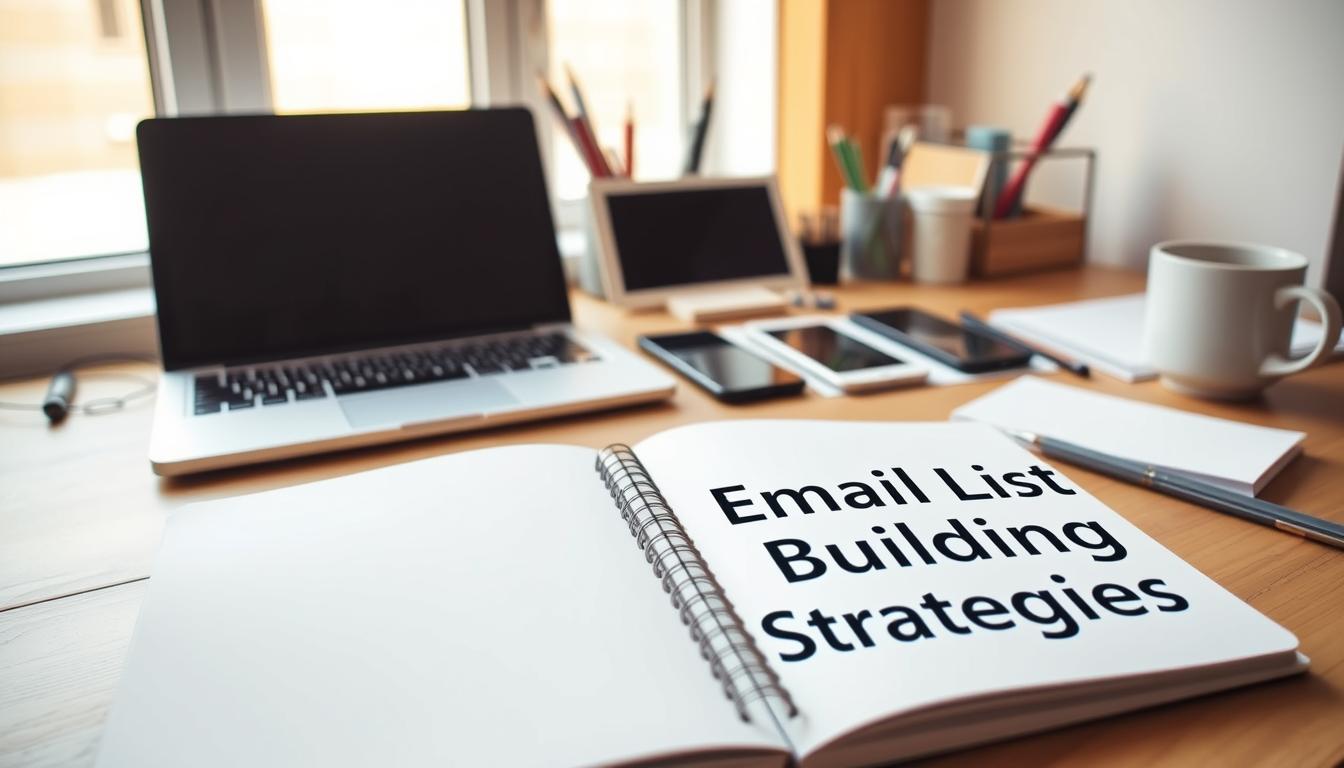Imagine this: you’re standing in a crowded marketplace, and instead of shouting to be heard, you have a direct line to your audience. That’s the power of an email list. In today’s fast-paced digital world, building an email list is more than just a strategy—it’s the foundation of a successful marketing approach.
But why is an email list so crucial? Unlike social media followers, your email list is an owned media channel. It’s a direct way to connect with your audience, nurture leads, and convert them into loyal customers. Studies show that email marketing can achieve conversion rates 4-10 times higher than traditional marketing methods.
One of the most effective ways to grow your email list is through well-designed forms. For instance, pop-up forms have been shown to boost list growth by an average of 50.8%, according to insights from Mailchimp. These tools not only capture leads but also help you build meaningful relationships with your audience.
By focusing on quality over quantity, you can create a list that drives higher engagement and better ROI. Whether you’re just starting out or looking to refine your strategy, understanding how to build and maintain an email list is essential for long-term success.
Key Takeaways
- Building an email list is the cornerstone of a successful digital marketing strategy.
- Email marketing offers higher conversion rates compared to traditional methods.
- Using pop-up forms can significantly boost your list growth.
- Focusing on quality leads to better engagement and ROI.
- Owned media, like an email list, provides a direct line to your audience.
Understanding Email List Building and Its Importance
Building a strong email list is the backbone of any successful digital marketing strategy. It allows you to connect directly with your audience, fostering trust and nurturing relationships that can lead to loyal customers. Unlike social media, where algorithms control visibility, your email list is a direct line to your audience, ensuring your message is seen.
Building a Solid Marketing Foundation
A high-quality email list is more than just contacts—it’s a foundation for meaningful engagement. By focusing on quality over quantity, you ensure that your subscribers are genuinely interested in your content. Studies from Shopify and GetResponse highlight that targeted, engaged lists drive higher conversion rates and better customer relationships.
The Value of Quality Subscribers
Quality subscribers are those who actively engage with your content. They opt-in because they find value in what you offer. Using tools like Shopify Forms helps gather verified email addresses, ensuring your list is both accurate and engaged. A clear strategy, proper segmentation, and quality content are essential for maintaining this engagement.

By building trust and delivering value, you create a loyal audience. This foundation not only enhances your marketing efforts but also drives long-term success. Remember, a well-crafted email list is a powerful tool in your marketing arsenal.
How do I create an email list?
Creating an email list from scratch is a straightforward process that can significantly boost your marketing efforts. Start by setting up a signup form using tools like Shopify Forms or Mailchimp. These tools help you gather essential information like email addresses and other details from your visitors.
Next, integrate your signup form into your website and landing pages. Make sure the form is user-friendly and persuasive. For example, offer incentives such as discounts or free resources to encourage visitors to share their email address. This strategy not only grows your list but also builds trust with your audience.

Don’t forget to leverage social media to drive additional signups. Platforms like Instagram and TikTok, with their high engagement rates, can be great channels to promote your email list. Share links to your signup forms and use eye-catching visuals to attract attention.
Finally, optimize your forms and campaigns for conversions. Use A/B testing to compare different designs and content types. Automate the process of welcoming new subscribers with a well-crafted email sequence. This guide provides step-by-step instructions to help you build and maintain a healthy, engaged email list that drives real results for your business.
Optimizing Your Signup Forms and Landing Pages
Designing effective signup forms and landing pages is crucial for growing your email list. A well-crafted page can significantly boost conversions and help you build a loyal audience.
Designing User-Friendly Forms
Keep your signup forms simple and straightforward. Studies show that shorter forms with clear fields tend to have higher conversion rates. Ensure your forms are mobile-responsive, as many visitors will access them via smartphones or tablets. Use compelling call-to-action buttons with contrasting colors to draw attention and encourage clicks.
Crafting High-Converting Landing Pages
A dedicated landing page focused on capturing email addresses can greatly enhance your signup rates. Keep the layout clean and free from distractions. Use persuasive messaging that clearly communicates the value of subscribing. A/B testing can help you identify the most effective designs and content for your audience.
| Best Practices | Benefits |
|---|---|
| Mobile-responsive design | Ensures accessibility on all devices |
| Clear call-to-action buttons | Increases conversion rates |
| Simple form fields | Reduces friction for signups |
| A/B testing | Helps optimize design and content |
By focusing on user-friendly designs and high-converting landing pages, you can create an opt-in experience that resonates with your target audience and drives growth for your email list.
Leveraging Pop-Up Forms for Rapid Growth
Pop-up forms are a powerful tool for capturing attention and growing your email list. When designed and timed correctly, they can significantly boost your subscriber base. Research from Mailchimp shows that users who implemented pop-up forms saw their email list growth increase by an average of 50.8%. This highlights the potential of pop-ups as a key strategy in your marketing campaign.
Effective Pop-Up Design Techniques
A well-designed pop-up form is essential for maximizing conversions. Start by offering a compelling lead magnet, such as a discount or exclusive content, to entice website visitors to subscribe. Keep the form simple, with clear fields that make it easy for users to sign up. The timing of your pop-up is equally important—trigger it when a visitor has engaged with your content, such as after scrolling 50-60% of the page.
| Best Practices | Benefits |
|---|---|
| Offer a lead magnet | Increases incentive to subscribe |
| Trigger at the right time | Captures engaged visitors |
| Keep forms simple | Reduces friction for signups |
| Use A/B testing | Optimizes design and timing |
By focusing on effective design and strategic timing, pop-up forms can become a cornerstone of your email list growth strategy. Test different designs and triggers to find what works best for your audience and continuously refine your approach for optimal results.
Integrating Facebook Ads and Social Media Strategies
Social media platforms are powerful tools for expanding your reach and building your email list. Platforms like Facebook offer advanced targeting options that can help you connect with potential customers who are likely to be interested in your product or services.
Targeting Lookalike Audiences with Facebook Ads
Facebook Ads allow you to target lookalike audiences based on the data from your existing email list. This strategy can produce a 29% better ROI compared to traditional targeting methods. By leveraging the demographics and interests of your current subscribers, you can create highly targeted campaigns that drive quality traffic to your signup pages.
Using Multiple Social Platforms for Lead Generation
Don’t limit yourself to just one platform. Instagram, LinkedIn, and other social media platforms can be used to promote your email list and generate leads. For example, you can share links to your signup forms, use eye-catching visuals, and offer incentives like discounts or exclusive content to encourage visitors to subscribe.
By integrating Facebook Ads and other social media strategies into your marketing efforts, you can create a cohesive campaign that aligns with your overall email marketing objectives. This approach not only enhances your brand’s visibility but also drives high-quality leads to your email list.
Creating Irresistible Lead Magnets and Signup Incentives
Attracting potential customers often requires more than just a compelling message. Offering value upfront can make all the difference. This is where lead magnets and signup incentives come into play.
Developing Valuable Content Upgrades
A lead magnet is more than just a freebie; it’s a gateway to building trust with your audience. Consider offering exclusive discounts, free guides, or content upgrades that address specific needs. For instance, a mini-ebook solving a common problem can be highly effective.
| Incentive Type | Benefits |
|---|---|
| Exclusive Discounts | Encourages immediate action and trials |
| Free Guides/Ebooks | Provides actionable value, fostering trust |
| Content Upgrades | Targets specific audience needs effectively |
| Contests/Giveaways | Drives engagement and excitement |
Clearly communicating the benefits of your incentives is crucial. Whether it’s a discount or a guide, ensure your audience understands the value they’re receiving. This approach not only boosts signup rates but also sets the stage for a loyal customer base.
Designing Automated Welcome Emails and Engagement Campaigns
Welcome emails are your first chance to make a lasting impression on new subscribers. They have a clickthrough rate four times higher than other emails, making them a powerful tool for engagement. A well-crafted automated welcome series can transform new sign-ups into loyal customers.
Setting Up Triggered Email Sequences
Triggered email sequences automatically send based on subscriber actions, like signing up. These emails save time and ensure consistency. For example, Mailchimp’s automation tools let you create a series of three to five emails over 30 days. This approach helps build trust and provides value upfront.
Personalization Techniques for Better Engagement
Personalization is key to higher open rates. Use segmented lists to tailor content. For instance, Shopify Email’s welcome series uses subscriber data to create relevant messages. This personal touch makes your emails more engaging and valuable to your audience.
| Best Practices | Benefits |
|---|---|
| Automated workflows | Consistency and time-saving |
| Segmented messaging | Higher engagement |
| Clear CTAs | Guides subscriber actions |
By combining automation and personalization, you can create engaging campaigns that resonate with your audience. Use tools like Mailchimp and Shopify Email to design sequences that deliver results.
Maintaining a Clean and Engaged Email List
Maintaining a clean and engaged email list is essential for improving deliverability and engagement. Industry experts emphasize the importance of regularly cleaning your email list to ensure optimal performance. A well-maintained list helps avoid spam traps and ensures your messages reach the right audience.
Segmenting and Regularly Updating Your List
Segmenting your email list based on behavior, demographics, and engagement patterns allows for more personalized and relevant communication. This approach increases open and click-through rates, as subscribers receive content tailored to their interests and preferences.
| Best Practices | Benefits |
|---|---|
| Regularly purge inactive addresses | Reduces spam risks and improves deliverability |
| Segment based on behavior | Increases engagement with targeted content |
| Re-engagement campaigns | Reactivates dormant subscribers |
By “scratching” your list of outdated data and focusing on quality, you enhance campaign performance. Use tools to validate addresses and remove hard bounces. Re-engagement campaigns can help revive inactive subscribers, ensuring your list remains vibrant and responsive.
Regular updates and segmentation are key to a healthy email list. This process not only boosts engagement but also protects your sender reputation, ensuring long-term success in your email marketing efforts.
Conclusion
In today’s competitive market, a well-crafted email list stands as one of your most valuable assets. By integrating signup forms, pop-up strategies, and targeted campaigns, you can drive long-term business growth and foster meaningful relationships with your audience. This guide has provided actionable insights and data-driven strategies to help you build, optimize, and maintain an effective email list.
Personalization and list segmentation are key to higher engagement. Leverage multiple media channels to expand your reach and ensure your message resonates with your audience. Remember, investing time in email marketing leads to better customer relationships and improved ROI. With the steps outlined in this guide, you can start reaping the benefits of a robust email list immediately.
